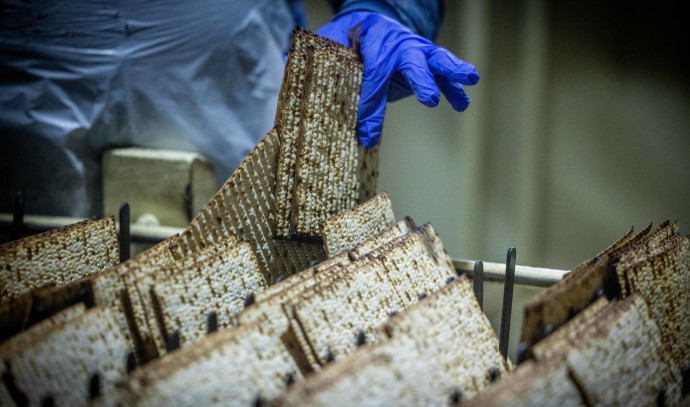With Passover customs, matzah has rightfully gained the most dubious reputation.
Abdominal pain, gas, constipation and diarrhea are only some of the problems that matzah may cause, especially if you follow the laws of the holiday and eat lots of matzah, plus cook dishes like matzo brei.
Why does this happen? How can symptoms be alleviated, and what should people with digestive system diseases eat during Pesach? Here are all the answers.
Why matzah causes stomach aches
Standard matzah is made from flour that contains one of the five types of grain: Wheat, barley, oats, rye or spelt. The dough from which matzahs are made contains only water and flour, so they have very little dietary fiber.
Matzahs are made with very little liquid compared to bread. It’s this fact that makes matzoh a major cause of digestive problems during Passover.
The lack of dietary fiber and liquid in matzah means that some people may suffer from significant constipation along with abdominal bloating, gas and stomach pain. For others, eating matzah may actually cause the opposite situation with diarrhea, possibly due to an intolerance to its ingredients or to other holiday foods.
How to relieve constipation and diarrhea caused by matzah
The most basic rule is to minimize food products that make you feel bad. If the main problem is constipation, then eat small amounts of whole wheat matzah and drink lots of water. Eat lots of produce to get enough dietary fiber; this can significantly alleviate the problem.
If you suffer chronically from constipation and the problem worsens during or after Passover, ask your doctor for medicine to alleviate the symptoms. For diarrhea, the problem is more complex; it’s advisable to avoid eating matzah as much as possible, and if there’s no other choice, take antidiarrheal pills.
Take note that holidays are characterized by large meals and sometimes a change in the regular menu and changes other than matzah may cause stomach pain. The Passover menu, which is rich in eggs, oils and potatoes, may worsen stomach discomfort so it’s important to maintain a balanced diet that includes vegetables and fruits and drink a lot of water.
How to relieve gas
The colon is home to billions of bacteria, and is where certain foods, especially those that haven’t been thoroughly digested in the stomach and small intestine are broken down by bacteria. Gas, of course, is the fragrant and bloated byproduct.
Passover is very problematic in terms of gas because apart from the problematic matzah, many foods may increase the production of gas.
Examples are starchy foods such as potatoes and corn, dairy products (especially for those with lactose intolerance) and various vegetables like onions, cabbage and broccoli.
Eating sugars in desserts and many artificial sweeteners like sorbitol can also make gas worse. For some people eating too many eggs, especially hard-boiled ones, can cause pain and excess gas.
In this case, too, know which foods make you feel bad and make the gas worse and just avoid them. If necessary, gas can be relieved with various over-the-counter medications such as simethicone i.e. activated charcoal and colpramine tablets. Medicines based on bismuth (like Kalbeten) may also relieve stomach pain and gas.
Some special cases
For patients with inflammatory bowel diseases, such as Crohn’s disease, eating matzah can worsen abdominal pain, diarrhea and even cause intestinal obstruction.
In these cases, minimize eating matzah and make sure to chew slowly and thoroughly. Drink only water, not juice or soda, and drink lots of it during the day.
Also, Celiac patients also need to be more careful during and after Passover. Note that in recent years, thanks to increased awareness, it’s possible to obtain gluten-free matzahs made from oats.




